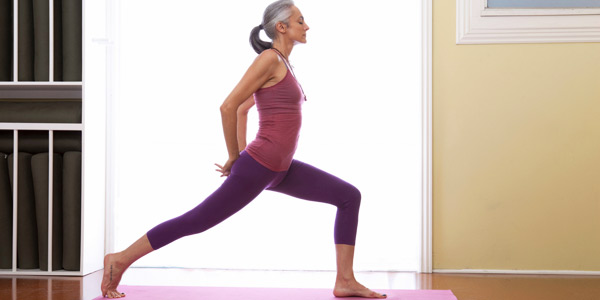
At first doctors thought Meltzer had a brain tumor. What they determined after further tests, however, was that she had multiple sclerosis, an autoimmune disease that affects the brain and central nervous system and was causing optic neuritis, an inflammation of the optic nerve that can cause a partial or complete loss of vision.
“I was living independently, doing my job, taking care of my child and then I had to look to my parents to take care of me,” Meltzer said.
Almost two decades later, Meltzer, out of a wheelchair and walking without a cane, was one of 14 women with moderate disability due to MS who participated in a pilot trial conducted by the Rutgers School of Health Related Professions. A specially-designed yoga program for these MS patients not only improved their physical and mental well-being but also enhanced their overall quality of life.
“I felt like I became steadier and stronger in my core,” Meltzer said. Prior to yoga, she described herself as a “wall walker,” someone who felt safer holding onto the wall in order to get around. “To be able to stand on one leg and feel balanced is amazing.”
Susan Gould Fogerite, director of research for the Institute for Complementary and Alternative Medicine in the School of Health Related Professions, said that although there is widespread evidence that yoga is being used as a form of exercise by those with MS, much of the feedback has been anecdotal and there isn’t much empirical data regarding its safety and efficacy.
This is why she and her colleagues, Evan Cohen and David Kietrys, physical therapists and associate professors in the School of Health Related Professions at Stratford, decided to undertake the small pilot study, believing that a specialized yoga program for MS patients — which incorporates mind, body and spirit — would be beneficial to everyday living.
What they discovered at the end of the eight-week trial was that those who participated were better able to walk for short distances and longer periods of time, had better balance while reaching backwards, fine motor coordination, and were better able to go from sitting to standing. Their quality of life also improved in perceived mental health, concentration, bladder control, walking, and vision, with a decrease in pain and fatigue.
“Yoga is not just exercise, it is a whole system of living,” said Fogerite, an associate professor, who, along with Kietrys, will present the results on September 26 at the Symposium on Yoga Research at the Kripalu Institute in Massachusetts. “The panel of experts who advised us on the trial wanted to make sure that we provided a fully integrated program that included philosophy, breathing practices, postures, relaxation and meditation.”
The yoga pilot trial was held at Still Point Yoga Center in Laurel Springs, a southern New Jersey town close to Philadelphia. Of the 72 individuals who were interested in participating, only 16 were eligible based on medical and other criteria and availability. Of those, 15 were enrolled and 14 completed the program after one person had to withdraw because of an unrelated health problem.
Meltzer and the other women who participated in the trial ranged in age from 34 to 64. Some had been diagnosed with MS within the last two years while others had been living with the illness for up to 26 years. For 90 minutes, twice a week for two months, they practiced techniques and exercises that would improve their posture, help to increase stamina, and teach them how to relax and focus.
“This study, I hope, is one of many that will give us the clinical information we need,” said Fogerite. “Yoga is not currently being widely prescribed for people with MS, although it might turn out to be a very helpful treatment.”
The yoga practices were done by the women in the study sitting, standing, or lying on yoga mats, and using metal folding chairs situated close to the wall to provide them with more support.
“What was so nice about this experience was that although everyone was at a different level of the disease, we felt like we were all together, so I think the camaraderie helped,” said Meltzer. “And it wasn’t just about gaining more mobility and balance in our legs but our arms and necks felt stronger as well.”
Fogerite said a larger randomized controlled trial would be needed to determine whether yoga could be used as a prescribed treatment for individuals with moderate disability due to MS. More than 2.3 million people — two to three times more women than men — throughout the world are diagnosed with this disease which can cause poor coordination, loss of balance, slurred speech, tremors, numbness, extreme fatigue and problems with memory and concentration.
“When I was first diagnosed I no longer felt safe in my own body,” Meltzer said. “I didn’t trust my body at all. What the program did was really bring that trust back.” The study done by Rutgers University.